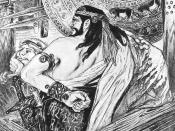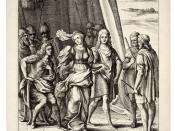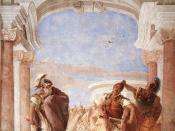Dr. Lamson
Pooneh Khazaeipool
Human Situation
the Force
Erotic love and affection in Homer's Iliad is ultimately the destructive force throughout the text. It bring forth a series of unfortunate, gory events; ones that have impact not only on the parties involved but also on a larger blameless population.. This essay compares and contrasts the the affection between Achilles and his stunning battle prize, Briseis, and the love quarrel between Helen, Menelaus, and Paris, which drag different outsiders into their issue initiating severe conflicts. it is the resistance to forgive and back-down that marks love in the iliad as the destructive force.
First off, it is necessary to address that Achilles and Briseis show definite affection towards one another. Before that can be proven, the term "affection" must be explained: this sensation is far from the feeling that a warrior like Achilles for his fellow comrade Patroclus. Humanity expresses a desire for competition and superiority especially at the time so when Agamemnon was told to return Chryseis, he bluntly declare the desire to get Achilles' "own beautiful prize" now that he had to return a woman.
Greek soldiers receive prizes from the battles but the women were to be served as maids but Briseis turned out to be something more important to Achilles hence the possessive and envious nature. Though women were primarily objective at the time, "Achilles' chest was a rough knot of pain" at the thought of losing Briseis. Then He draws his "sword that hung by his thigh" with anger to strike Agamemnon and this instinct is very much related to his own sexual desire and pride. When Agamemnon wishes to forcefully take away the
Khazaeipool 2
very person that satisfies Achilles' sexual quota, Achilles decides to prove his dominance and superiority by body language and ultimately,


